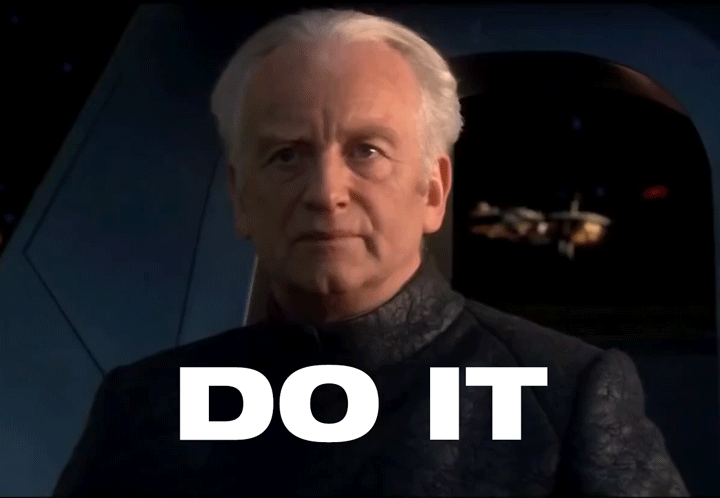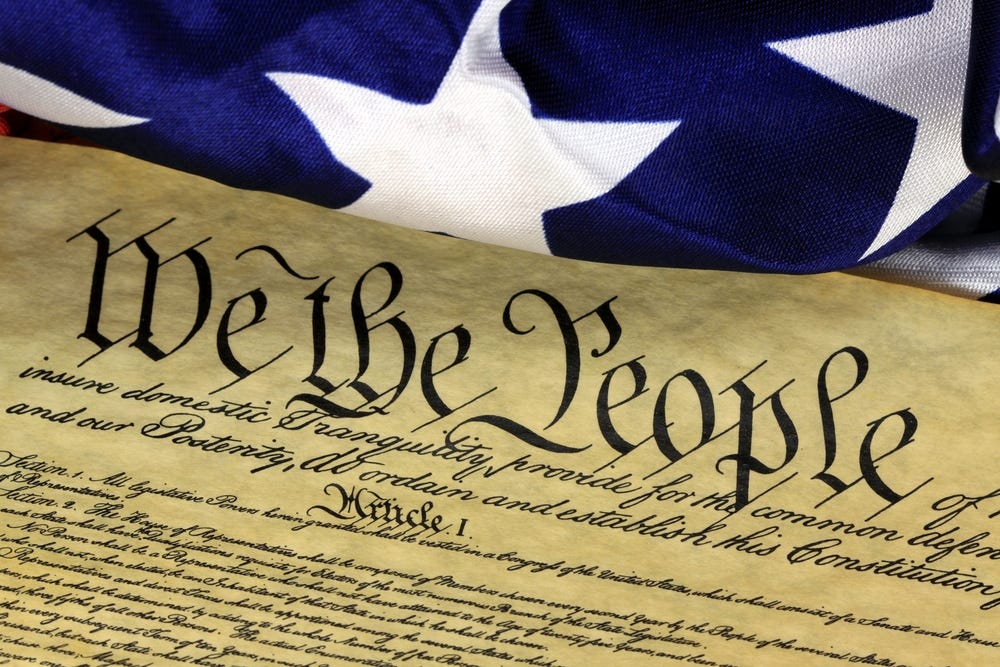A Republic, If We Would Just Call It That
The term republic is specific, clear, & points to the value of the founding vision. The term democracy is vague, ambiguous, & creates attitudes that are unraveling key aspects of American governance.
In this issue of the Self-Evident newsletter, I’ll be giving my two-cents on whether we should refer to the American form of government as a republic or a democracy, discussing a few aspects of Marxist thought and sociology as I introduce an idea I call faultline theory, and offering a quick note on whether or not polls that fail to forecast election results are accurate or not.
Get the Self-Evident newsletter in your inbox:
A Republic, If We Would Just Call It That
A common retort on Right-wing social media is the indignant assertion that “America is a republic, not a democracy.” The assertion isn’t wrong but it’s not quite wholly right.
The founders eschewed the term democracy because, at the time, it was connected to pure or direct democracy, where each and every issue would come before the whole body of the people. Such majoratarian rule tends towards tyranny just as much, if not more, as despotism and dictatorship. Any notion, even the most restrictive to personal freedom, can become law at the say of half the electorate plus one.
So, instead of such a direct democracy, the founders gave us a Republic, a constitutionally restrained representative government.
But in academics, the use of terms and definitions has evolved since the founding generation. Today, there are many more ways to describe a democracy than just as a direct one. Specifically, that which the founders called a republic can also now be accurately described as a liberal democracy or a constitutional democracy (liberal is used in this description in its original and accurate sense). And, because the vast majority of democratic nations today have forms of liberal, constitutional democracies and not direct democracies, it can easily be argued that America is most definitely a democracy as is generally understood in the term’s modern use.
However, there’s a big but. The American population today is woefully ignorant when it comes to civics and the form of their government. Their uninformed, and often misinformed, grasp of political knowledge tends towards failing to understand even the simplest forms of nuance. It’s true that I can throw the ideas of liberal or constitutional democracy into a term paper and my professors would know exactly what I was talking about, grasping the distinct and fundamental differences between those forms of democracy and majoritatarian rule through direct democracy. But such nuanced scholarly usage of the term democracy is divorced from the haphazard popular usage of the word.
Neither the terms liberal, democracy, or even constitution are generally used with any amount of accuracy, nuance, or even with much intellectual honesty.
Thanks to FDR and left-wing statists after him, those we call "liberal" today are social democrats and progressives. Believing human progress proceeds as a top-down government project as opposed to developing from individual endeavor within a sphere of liberty, modern liberals are just a few Das Kapital readathons short of being total philosophical opposites of the classically liberal founding fathers. Hardly committed to preserving the remnants of the American Republic’s liberal order, let alone reasserting it, their vision is social democracy and the welfare state, a project that has been and continues to be a wearing down of the republican (note the small r) and federalist processes that are impediments to their ambitious, and often radical, policies.
As for the term democracy, we do not live in a political atmosphere where democratic processes are understood to provide legitimacy and participation in a republican form of government where each voice remains important and minority rights are inviolate even in the face of an overwhelming majority. Instead, we live in a political atmosphere where partisans on both sides seek to wield majorities as absolute mandates, viewing a notion of direct democracy as the ultimate aim and imbuing majority opinion with a pseudo-religious sheen that no objection deserves to breech.
Both Barack Obama and Donald Trump have governed as if the elections themselves have settled all the questions. They have each in turn behaved in a way that suggests the mandate of a majority is absolute and electoral losers should either get with the program or keep their traps shut. Not only that, but they and their followers have worshiped so fervently at the thrones of electoral mandate that all oppositional elements of our society (the media, the courts, Congress, the Supreme Court, the opposition party, et al.) are derided as anti-democratic or even treasonous for daring to stand in the way of “what the people voted for.”
Today, there are growing elements on both sides of the aisle that are clamoring for weakening, if not outrightly abolishing, key elements that create the separation between what is scholarly understood as liberal, constitutional democracy and the majoritarian rule of direct democracy.
The term democracy may have evolved in its use in the classroom and among intellectuals, but the public understands it to mean what it's always meant: majoritarian rule. And when the structures of a republic operate as intended and frustrate majoritarian rule, the public who keeps hearing everyone call our nation a democracy thinks that something has gone wrong, that the system has betrayed them in some fundamental way.
It is in such times where nuance has fled and confusion reigns supreme, that we should attempt to use the clearest and most concise terms in our speech and dialogue. The term republic is specific, clear, and points to the value we should be placing on the founding vision. Meanwhile, in the present atmosphere, calling our nation a democracy is mostly true but is nevertheless vague, ambiguous, and is creating a permission structure for unraveling key aspects of American governance.
So yes, in the classroom and in scholarly essays, I might talk about liberal and constitutional democracy. But in everyday conversation and when I’m writing for non-academic consumption, I will eschew the term democracy as the founders did and seek to reassert the term republic when talking about the American form of government.
Marxism is a Self-Fulfilling Prophecy
(This section introduces some ideas I’ve been kicking around as part of what I’m terming faultline theory)
Marxism, in all its forms, becomes a self-fulfilling prophecy. The more we talk about economic classes, the more people identify themselves by the construct of class, the more the theory of social conflict plays out between classes.
This is why mixed economies and social democracy ultimately erode free systems of government. Overtime, socialization towards an excessive focus on inequality centered on identity and class overshadows citizenship, legal equality, and equal opportunity in a sphere of liberty.
No free society can ultimately survive a demand for equal outcomes because it's simply not possible without shattering individual freedom. Social democracy inevitably devolves into social conflict between hostile camps.
Some will demand a return to true liberalism and the individual freedom that's been curtailed in the effort to promote equality. Others will demand further steps towards true socialism as the remnant aspects of republicanism frustrate the efforts to seek truly equal outcomes.
Ultimately, Marxist sociology and Jeffersonian governance are incompatible. Mixing them decays and corrodes the foundations of civil society and is caustic towards the notions of free citizenship and the norms and moors that allow us to find common cause in something that transcends the constructs of socio-political, economic, and cultural divisions.
The dysfunction in American society today is far more than the product of a single politician or a single party. It's the inevitable collapse of civil order that results from trying to build a political system on two foundations that dramatically and often violently pull apart.
A Quick Note on Polls
The last four years has seen a lot of talk about the 2016 polls being wrong and this year’s polls have a lot of people wondering about their accuracy and their bearing on the results of the election itself. But personally, I think we’re looking at polls the wrong way.
The scientific process of conducting a poll gives us a snapshot of admitted attitudes at a given moment. It can't read the minds of participants nor divine the next moment, let alone tell us how voters will actually act when their attitudes meet the ballot box nor what issues could alter attitudes days, weeks, or months down the road.
A poll can both be 100% accurate when it was taken yet completely fail to reflect what ended up being most important to voters when they step into the ballot box.
If the 2016 election had happened days after the Access Hollywood tape came to light, the story would be how generous the polls had made Trump's chances appear before his crushing defeat.
Instead, a month's time softened the blow, and Comey's public reopening of the investigation into Hillary's emails created a completely different set of attitudes and considerations for voters.
Polls are tools of analysis that grant insight into what people are caring about and how that translates to who they think they'll vote for on election day. Polls are an important part of an election's story and can chart the evolution of public attitudes as the story plays out. But polls are not ultimately forecasts of what will happen on election day.
A poll is a thermometer, and a thermometer only tells us what the temperature is one moment at a time. It has no way to tell us how hot it will be beyond that single moment. If a thermometer tells us we've had a four-day heatwave, the cold front that hits on day five doesn't make the thermometer wrong on the days it told us it was hot as hell.
Sure, a string of hot days can lead us to assume the trend will continue, but that's us making an inferred judgment, not the thermometer. When ol' mother nature surprises us, it's our forecast that was wrong, not the thermometer.
Really, what we're doing with the way we look at polls is looking at them like fortune tellers and expecting them to forecast an unknowable future. The variables that stand between even just one moment to the next are so vast as to defy any hope of total accuracy in any forecast of events.
If Biden showed up to the final debate without wearing any clothes or if Trump actually did shoot someone on Fifth Avenue, would polls conducted today be of any use for forecasting the election's result? It would be unreasonable and unrealistic to expect them to.
Yet, equally consequential, if not quite as farfetched, things are going to happen between today and election day, and we unreasonably and unrealistically expect polls conducted today to tell us what will happen on the other side of these unknowable events.
So really, polls are not right or wrong in what they forecast because they're not forecasting anything. They're accurate or inaccurate in whether they properly reflect attitudes when they were conducted.
Treating a poll as anything more than a snapshot in time is really just political astrology.
ICYMI
I republished a deepdive into what the founders meant by a well-regulated militia over on Medium. Check it out.
Subscribe, Share, Connect
If you haven’t subscribed yet, do it!

And, please share this newsletter, add any thoughts you might have in the comments section, and be sure to connect with me on Facebook, Twitter, or Parler.
Stay Free My Friends,
-Justin



